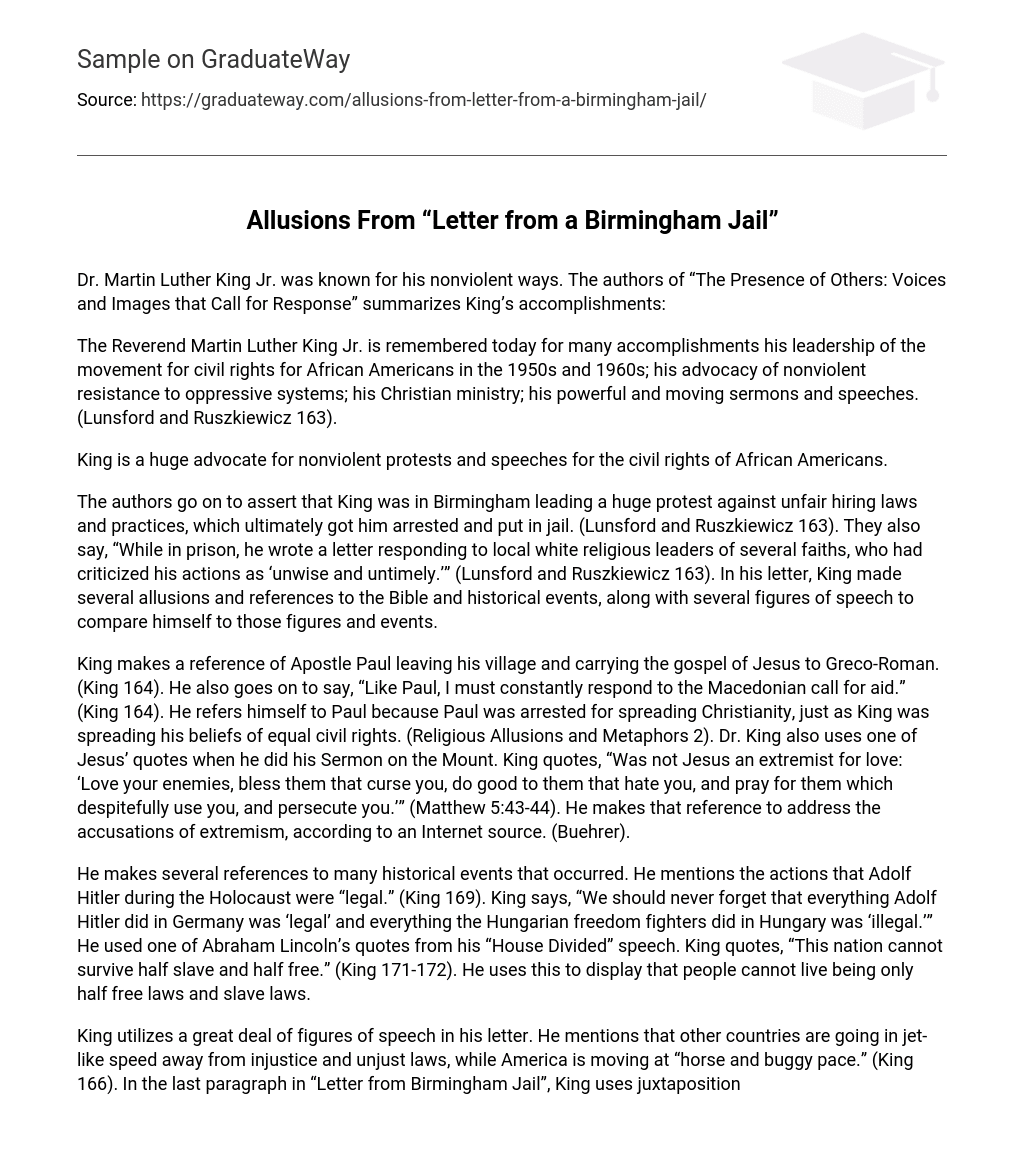Dr. Martin Luther King Jr. was known for his nonviolent ways. The authors of “The Presence of Others: Voices and Images that Call for Response” summarizes King’s accomplishments:
The Reverend Martin Luther King Jr. is remembered today for many accomplishments his leadership of the movement for civil rights for African Americans in the 1950s and 1960s; his advocacy of nonviolent resistance to oppressive systems; his Christian ministry; his powerful and moving sermons and speeches. (Lunsford and Ruszkiewicz 163).
King is a huge advocate for nonviolent protests and speeches for the civil rights of African Americans.
The authors go on to assert that King was in Birmingham leading a huge protest against unfair hiring laws and practices, which ultimately got him arrested and put in jail. (Lunsford and Ruszkiewicz 163). They also say, “While in prison, he wrote a letter responding to local white religious leaders of several faiths, who had criticized his actions as ‘unwise and untimely.’” (Lunsford and Ruszkiewicz 163). In his letter, King made several allusions and references to the Bible and historical events, along with several figures of speech to compare himself to those figures and events.
King makes a reference of Apostle Paul leaving his village and carrying the gospel of Jesus to Greco-Roman. (King 164). He also goes on to say, “Like Paul, I must constantly respond to the Macedonian call for aid.” (King 164). He refers himself to Paul because Paul was arrested for spreading Christianity, just as King was spreading his beliefs of equal civil rights. (Religious Allusions and Metaphors 2). Dr. King also uses one of Jesus’ quotes when he did his Sermon on the Mount. King quotes, “Was not Jesus an extremist for love: ‘Love your enemies, bless them that curse you, do good to them that hate you, and pray for them which despitefully use you, and persecute you.’” (Matthew 5:43-44). He makes that reference to address the accusations of extremism, according to an Internet source. (Buehrer).
He makes several references to many historical events that occurred. He mentions the actions that Adolf Hitler during the Holocaust were “legal.” (King 169). King says, “We should never forget that everything Adolf Hitler did in Germany was ‘legal’ and everything the Hungarian freedom fighters did in Hungary was ‘illegal.’” He used one of Abraham Lincoln’s quotes from his “House Divided” speech. King quotes, “This nation cannot survive half slave and half free.” (King 171-172). He uses this to display that people cannot live being only half free laws and slave laws.
King utilizes a great deal of figures of speech in his letter. He mentions that other countries are going in jet-like speed away from injustice and unjust laws, while America is moving at “horse and buggy pace.” (King 166). In the last paragraph in “Letter from Birmingham Jail”, King uses juxtapositions and makes it a metaphor; he wrote:
“Let us all hope that the dark clouds of racial prejudice will soon pass away and the deep fog of misunderstanding will be lifted from our fear-drenched communities, and is some not too distant tomorrow the radiant stars of love and brotherhood will shine over our great nation with all their scintillating beauty.” (King 176).
One Internet source says, “He compares prejudice to dark clouds and deep fog, while love and brotherhood are described as radiant stars that shine with scintillating beauty.” (Gallagher).
All in all, King uses multiple allusions and different figures of speech to defend his reasoning for the injustice in not only Birmingham, but in several southern states. His powerful use of historical figures as well as biblical figures impacted the public. Decades after King’s “I Have a Dream” speech and “Letter for Birmingham Jail”, his teachings about racial injustice are, in some ways, still present today. This letter serves as a purpose to apply the need for love and brotherhood towards one another and avoid all the unjust laws.





